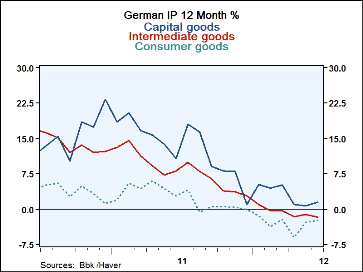 Global| Aug 08 2012
Global| Aug 08 2012German IP Continues to Sink
Summary
German IP fell by 0.9% in June after gaining back part of an outsized drop from April in May. The three month growth rate is a deep negative -5.9% annualized exceeding the pace of decline over 12-months. Construction output is falling [...]
 German IP fell by 0.9% in June after gaining back part of an outsized drop from April in May. The three month growth rate is a deep negative -5.9% annualized exceeding the pace of decline over 12-months. Construction output is falling sharply over three-months- a sharp reversal of past trends. MFG IP is off sharply over three months as well. MFG orders have been steadily decaying and they too are off sharply in the recent three months.
German IP fell by 0.9% in June after gaining back part of an outsized drop from April in May. The three month growth rate is a deep negative -5.9% annualized exceeding the pace of decline over 12-months. Construction output is falling sharply over three-months- a sharp reversal of past trends. MFG IP is off sharply over three months as well. MFG orders have been steadily decaying and they too are off sharply in the recent three months.
Europe remains weak. Just today the bank of England cut its growth outlook and the Bank of France looks for the economy to slip back into recession. Germany continues to be surrounded by a weak and faltering growth zone. The Eurozone’s problems continue to fester as there is no real short term support nor is there a longer run plan to lift it from its malaise. Differences among members on how to handle the crisis continue to be impediments to action.
It appears that weakness in the zone is beginning to have a more severe negative impact on the German economy.
May-12
Apr-12
Robert Brusca
AuthorMore in Author Profile »Robert A. Brusca is Chief Economist of Fact and Opinion Economics, a consulting firm he founded in Manhattan. He has been an economist on Wall Street for over 25 years. He has visited central banking and large institutional clients in over 30 countries in his career as an economist. Mr. Brusca was a Divisional Research Chief at the Federal Reserve Bank of NY (Chief of the International Financial markets Division), a Fed Watcher at Irving Trust and Chief Economist at Nikko Securities International. He is widely quoted and appears in various media. Mr. Brusca holds an MA and Ph.D. in economics from Michigan State University and a BA in Economics from the University of Michigan. His research pursues his strong interests in non aligned policy economics as well as international economics. FAO Economics’ research targets investors to assist them in making better investment decisions in stocks, bonds and in a variety of international assets. The company does not manage money and has no conflicts in giving economic advice.






